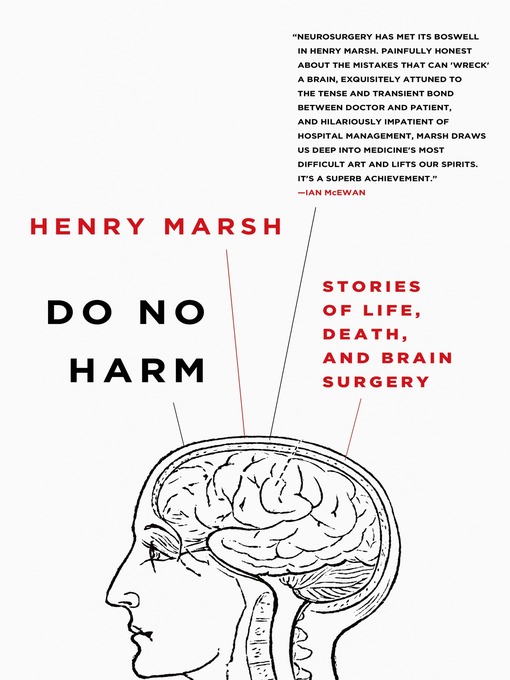
Do No Harm
Stories of Life, Death, and Brain Surgery
داستانهایی از زندگی، مرگ و جراحی مغز
کتاب های مرتبط
- اطلاعات
- نقد و بررسی
- دیدگاه کاربران
نقد و بررسی

Starred review from March 9, 2015
In this memoir of a long career, English neurosurgeon Marsh reveals both a “weary and knowing skepticism” and a striking determination to help the desperately ill despite the uncertainties. “The operating is the easy part, you know,” he writes of one neurosurgeon’s advice to him; “the difficulties are all to do with the decision-making.” Marsh’s remarkable, unblinking honesty shines through in each of the starkly different cases he describes, including a little boy with a progressive cancer whose family came to believe he could “go on being treated forever”; the death “without regret” of his own mother from metastasized breast cancer; and the devastating outcome of a difficult operation on an 11-year-old Ukrainian girl with a large but benign brain tumor that was slowly killing her. Surprisingly humble and introspective, Marsh can be hard on himself: “It’s not the successes I remember, or so I like to think, but the failures.” The stubborn bureaucracy of Britain’s healthcare system merits its own harsh meditation, though Marsh tempers his deep distrust of the system with compassion. This thoughtful doctor provides a highly personal and fascinating look inside the elite world of neurosurgery, appraising both its amazing successes as well as its sobering failures. Agent: Julian Alexander, Lucas Alexander Whitley Ltd. (U.K.).

Starred review from March 15, 2015
A British neurosurgeon delivers fascinating, often harrowing stories of several dozen cases intermixed with compelling digressions into his travels, personal life, and philosophy. In 25 chapters, each built around a neurosurgical operation (infections and strokes but mostly tumors), the author provides vivid accounts of patients before and after surgery as well as encounters with Britain's National Health Service, which is far skimpier than America's system (even hospital beds are in short supply). The quality of medicine, however, is first-class. American neurosurgical trainees serve in his hospital, and Marsh admires but does not share the gung-ho optimism of America's "death is optional" surgeons. While happy to recount dramatic cures, he admits that these are not routine in a neurosurgeon's practice and that aggressive surgery often leaves patients with catastrophic brain damage. Few American surgeons, worried about being sued (a legitimate concern), would dare write, "I am more experienced than in the past and more realistic about the limitations of surgery....I have become more willing to accept that it can be better to let someone die rather than operate when there is only a very small chance of the person returning to an independent life." Far more than the average doctor-memoirist, Marsh does not conceal his feelings, whether dealing with patients, colleagues, assistants, or superiors, and he spares no one when matters turn out badly. Readers will share his emotions, including contempt for a penny-pinching, meddling government. Unlike American doctor/government haters, there is no sour right-wing ideology or any impression that he is defending an obscenely high income. Nor does he trumpet his compassion; that is never in doubt. Beautifully written and deeply moving-one of the best physician memoirs in recent memory.

Starred review from April 1, 2015
Brain surgery is risky business, even with modern technologyparalysis, stroke, and bleeding are devastating complications. Little wonder that the first chapter in this amazing account of an English neurosurgeon's three-decade career begins, I often have to cut into the brain and it is something I hate doing. He works on cerebral aneurysms, head trauma, brain hemorrhage, ruptured discs of the spine, and loads of brain tumors. His instruments are crude (bone drill, wire saw, small scalpel) and sophisticated (operating microscope, Computer Navigation GPS for the brain). Marsh reflects on professional detachment, uncertainty, intense anxiety, shame, and fallibility. Breaking bad news to patients and witnessing so much misery is draining. Sometimes the most important decision he makes is to do nothing: not to operate. He recounts successful cases (an operation on a young pregnant woman who was going blind due to a meningioma) and failures (surgeries gone very badly). He writes about the necessity of kindness and honesty from doctors and the difficult balance between hope and reality. Marsh remains fascinated by the brain: how mere brute matter can give rise to consciousness and the electrochemical chatter of one hundred billion nerve cells. One of the best books ever about a life in medicine, Do No Harm boldly and gracefully exposes the vulnerability and painful privilege of being a physician.(Reprinted with permission of Booklist, copyright 2015, American Library Association.)

























دیدگاه کاربران